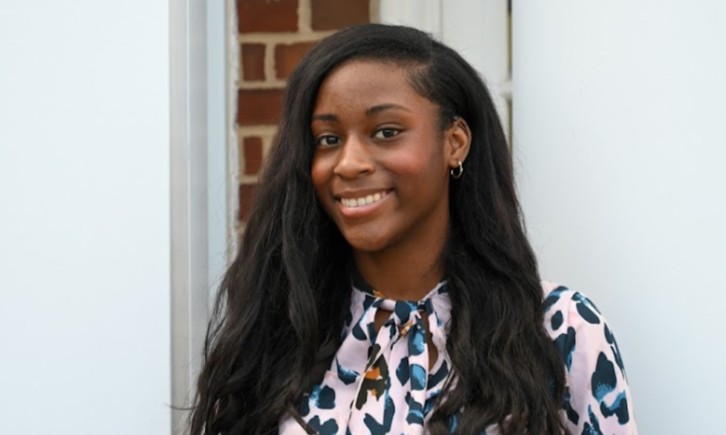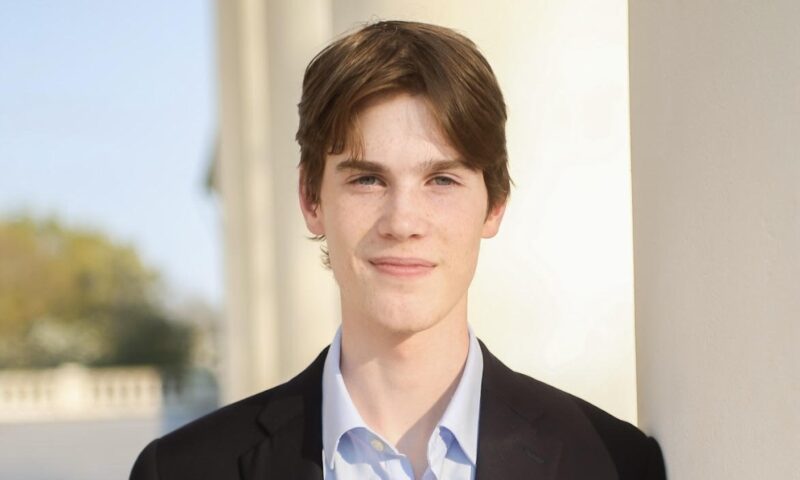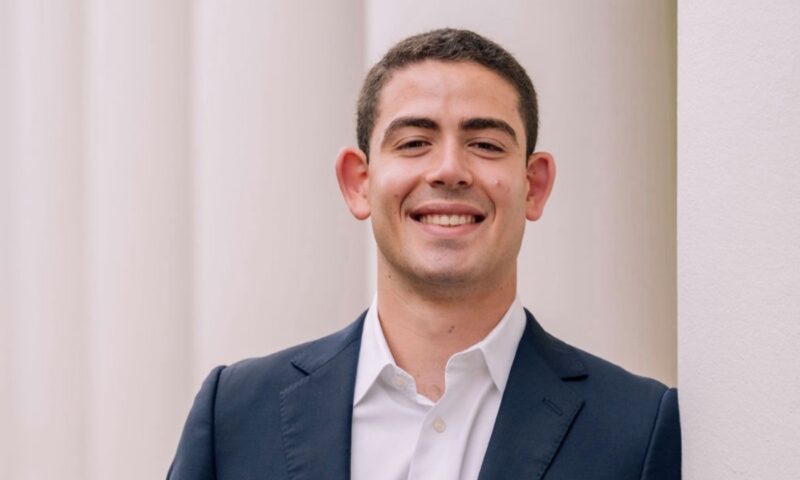Though still being written, Tim Brown’s story demonstrates how veterans can rely on the skills they developed in the military to succeed in schools across UVA and offer immense value to the University community.
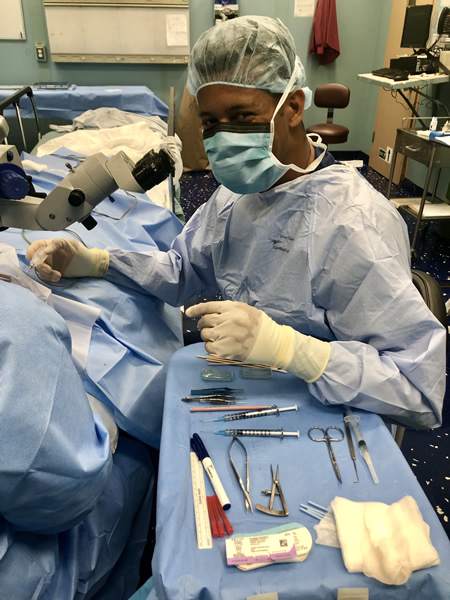 He’s come to the Comm School from the U.S. Navy, where he served for five years on active duty, followed by an additional year as a Department of Defense contractor to continue his previous work as a Surgical Technologist at Walter Reed National Military Medical Center, just outside of the nation’s capital.
He’s come to the Comm School from the U.S. Navy, where he served for five years on active duty, followed by an additional year as a Department of Defense contractor to continue his previous work as a Surgical Technologist at Walter Reed National Military Medical Center, just outside of the nation’s capital.
“My primary focus was in neurosurgery, though I also logged hundreds of hours in orthopedic and trauma surgery,” Brown says, explaining that as a surgical tech he assisted surgeons by managing medications and instruments during procedures—as well as providing an extra pair of hands.
Understandably, he found the role demanding, yet he was up to the task.
As a 19-year-old, he soon realized his desire to absorb information and deepen his knowledge outweighed any difficulties the work presented, when, during his training, his preceptor fainted during open-heart surgery. Brown remained calm.
“I was compelled to take over, holding retraction of the exposed heart as the surgeon proceeded with the operation,” he recalls. “Fortunately, my enthusiasm for learning and willingness to venture beyond my comfort zone served me well. Surgeons noticed this quality, granting me opportunities to participate in surgeries more extensively than many young techs typically experience.”
Eventually, the long hours and emergency surgeries on wounded warriors took an emotional toll, and Brown could feel himself burning out. Toward the end of his enlistment contract, he had the opportunity to shadow a friend at an asset management practice in Washington, DC, an experience that proved enlightening.
“I noticed a striking similarity between my role in the Navy and the world of business, particularly finance. Both professions demand the ability to perform well in high-pressure situations, with keen attention to detail and quick decision-making being paramount,” he says, drawing a parallel between the intense time commitment required to succeed in either field. He was also drawn to the camaraderie and shared responsibility of working in teams, as well as the variety of responsibilities offered in business through positions such as consulting and investing. “One day you might research the newest AI technology, and the next day you might speak to the management team of a hot sauce manufacturer. I yearn for a dynamic career,” Brown says.
His next step was the fortuitous result of hearing about a veteran scholarship from one of his Walter Reed peers who left the Navy to study Biology at Vassar a year before Brown was to complete his time in the service. Brown followed suit. With three months left in his contract, he received a call from the scholarship organization to schedule the first of several interviews that would lead to an offer to study in Charlottesville.
“A lot of my decision-making process was influenced by the surgeons I worked with at Walter Reed. I looked up to them, and when I would talk to them about the possibility of going to UVA, they would get jazzed up. One of the senior residents I worked with went to UVA for undergraduate school, and his experience really sold me,” he says, confessing that as a first-generation college student, he wasn’t sure what constituted a “good school,” but the plentiful advice and research he conducted led him to matriculate.
“From there, I knew I was the only thing standing between my goal of getting accepted into the Comm School,” Brown says.
Military Time Made for McIntire Prep
Before Brown shifted gears to pursue his degree, he was involved in many healthcare initiatives that changed people’s lives. One of his most profound memories came during a five-month mission in 2019 aboard hospital ship USNS Comfort, the very same vessel, he points out, that later made headlines during the peak of the pandemic when it provided aid in New York City. Stopping at 12 countries in South America, Central America, and the Caribbean, Brown was part of a mission supporting medical systems in partner nations struggling with the Venezuelan refugee crisis.

“Our impact on our patients was profoundly moving; I can still see the overwhelming joy on a grandmother’s face when she saw her six-year-old granddaughter for the first time after we removed cataracts that had kept her blind for over a decade,” he says. “This mission remains a powerful reminder of our nation’s ability to be both ‘great and good’ when we come together for a common cause.”
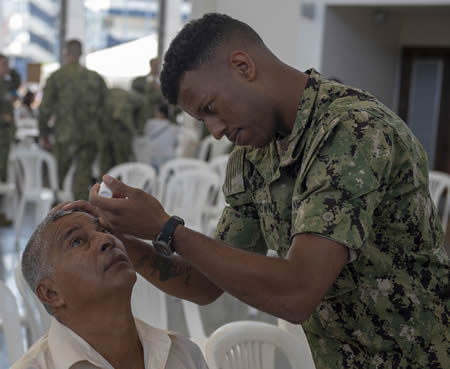 By the time that ship headed to New York to alleviate crowding at city hospitals during COVID, the Posse Veteran Scholar was on Zoom, finishing his first semester at UVA. His time in the Navy readied him for the new challenges he faced as a student.
By the time that ship headed to New York to alleviate crowding at city hospitals during COVID, the Posse Veteran Scholar was on Zoom, finishing his first semester at UVA. His time in the Navy readied him for the new challenges he faced as a student.
“The military teaches you responsibility, accountability, and leadership. By the time I was 21 years old, I was managing multidisciplinary teams, leading process improvement projects, and being accountable for million-dollar budgets. I witnessed people pass away and helped deliver new life to this world in the obstetrics suite. I had a level of maturity and perspective that was difficult to acquire at such a young age,” he says.
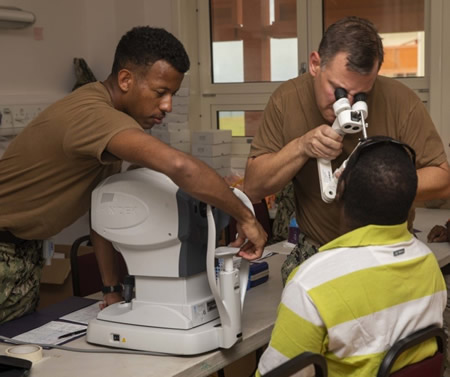 The result of those situations and responsibilities? “I felt right at home with the way McIntire’s classes are structured,” he says about enjoying being part of the team-based learning that remains central to the Comm School. “I hope my leadership and project management skills were a value-add to the many groups I’ve had the pleasure of being a part of.”
The result of those situations and responsibilities? “I felt right at home with the way McIntire’s classes are structured,” he says about enjoying being part of the team-based learning that remains central to the Comm School. “I hope my leadership and project management skills were a value-add to the many groups I’ve had the pleasure of being a part of.”
The interdisciplinary nature of the Integrated Core curriculum has opened his eyes to the multitude of avenues available to McIntire students who can apply what they’ve learned to many opportunities. “I came into the Comm School with a lot of self-taught knowledge of finance because that is what I perceived as ‘studying business,’” Brown admits. “Now that I’m almost finished with the ICE curriculum, I’ve realized that studying business goes much deeper than that.”
A Promising Future
Brown eagerly looks forward to a summer interning at a private equity firm, followed by his final year at UVA, but he doesn’t take his time on Grounds for granted.
“As a nontraditional student, I am acutely aware of what an amazing opportunity college is. I have changed and grown so much over the past five years that my former self probably wouldn’t recognize me today,” he says.
He’s also excited for Professor Jeffrey Lovelace’s Strategic Leadership class next spring. “As a fellow veteran, he’s been a fantastic resource and has been a mentor of mine since my first year, when we worked alongside the SVA [Student Veterans of America] on student veteran issues. I’m also looking forward to getting further into the weeds of finance, especially the fantastic capstones offered for the concentration.”
Brown already has plans in motion to apply his Commerce background as a force to do more good in the world. He and his partner, Environmental Sciences major Ashley Vanegas (A&S ’24), another veteran student he met in the military and who followed a similar path to UVA, are passionate about the environment and animal conservation and are considering launching a nonprofit focused on those issues.
In his professional future, he’s intent on continuing along the route where his internships have led, toward working in private equity. “I’m looking for a career where I wear many hats, and private equity has the right balance for me,” Brown says. “As an investor, you’re always learning, and depending on the fund’s strategy, you’re not just learning about different businesses but also shaping how they operate; that’s my definition of a dream job right there.”
A Vision for Veteran Students
When he began as a veteran student, Brown had concerns about how his background would shape how UVA students and staff may have perceived and treated him, and originally felt that support was lacking. He engaged with the University’s chapter of SVA, which helped him to navigate his GI Bill, find housing, choose classes, and more. That assistance led to him serve as President as a first-year in 2019.
“My team and I did a lot of good there,” he explains. “We helped open the Veteran Student Center in Newcomb Hall, which has been a game-changing resource for our veteran community. We also raised more than $10,000 for Afghan refugees following the Afghanistan withdrawal, and renovated an outdoor deck for the Virginia Institute of Autism, among other things.”
Brown says that he attempted to imagine the SVA as a business and its members as customers: “Thinking about it that way helped me connect and leverage what I was learning in the Comm School into a real-world situation.”
Acknowledging that, while the formation of the Veteran Student Center was a significant first step, there’s still plenty of work to be done on Grounds to support veteran students.
“I’d like to see a more focused effort in supporting student veterans through a dedicated veteran director position. It’s a hallmark of any ‘veteran-friendly’ school and will encourage more undergraduate student veterans to apply to UVA,” he says. “As it stands, we enroll about 10-15 undergraduate student veterans per year; those numbers could and should be higher for a flagship school in a state with the country’s second-highest rate of veterans per capita.”
The upside would be immense, as it’s clear that military service gives veterans a leg up when they begin their college careers, having developed leadership, teamwork, and adaptability skills. “We are students who have had the opportunity to grow and learn from life experiences beyond the classroom,” he says, explaining that those experiences often enrich classroom discussions, contributing perspectives that help all students to reach a well-rounded understanding of many subjects both with Commerce and beyond it.

